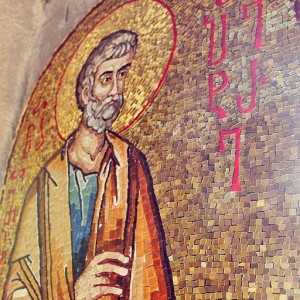 εἰς κληρονομίαν ἄφθαρτον καὶ ἀμίαντον καὶ ἀμάραντον, τετηρημένην ἐν οὐρανοῖς εἰς ὑμᾶς
εἰς κληρονομίαν ἄφθαρτον καὶ ἀμίαντον καὶ ἀμάραντον, τετηρημένην ἐν οὐρανοῖς εἰς ὑμᾶς
Translation:
into an inheritance that is imperishable, undefiled, and unfading, that is kept in heaven for you,
Grammatical, Lexical, and Syntactical Matters:
1. Two termination adjectives in 1 Peter: ἄφθαρτον καὶ ἀμίαντον καὶ ἀμάραντον. The endings of these three adjectives all look masculine instead of feminine. What do they modify? All three modify κληρονομίαν. What attributive (adjective) position are they in? They are all in 4th position (no article for noun or for the adjective). If you look up all three of these adjectives in your Greek lexicon, you will see that all three are two termination adjectives. The lexicon indicates this by providing the word plus one additional ending (ἄφθαρτος, ον). Most adjectives have three endings or terminations (ἀγαθός, ή, όν). The first ending is the masculine one (ος), the second is the feminine one (η), and the third is the neuter ending (ον). 1 Peter contains a number of two termination adjectives. In this case, the -ος ending does double duty. It is the form used when the adjective modifies both masculine and feminine nouns. What is truly odd in 1 Peter 1:4 is that Peter strings together three two termination adjectives in a row.
2. τετηρημένην. Parsing: Perfect, passive, participle, accusative, singular, feminine (τηρέω). In a previous post, I encouraged you to use my participle handout to answer 6 questions about every participle (see participle handout under Greek resources).
a. Is this participle adjectival or adverbial? It agrees in case, number, and gender with κληρονομίαν, so it must be adjectival (attributive adjective). If it is adjectival, why does it not have an article? It is in the fourth attributive position (see above).
b. Why it is passive? This is probably a divine passive, which means that God is the implied agent who does the keeping.
c. What is the subject of the participle? In the case of adjectival participles, the word that it agrees with is generally its subject (κληρονομίαν).
d. What is the verbal aspect of the participle and its time element? It is in the perfect tense, which means that it is stative in aspect. Stative aspect has to do with a state that can be a present state, a past state, or a state that starts in the past and continues into the present. The emphasis here appears to be on a present state (“is kept”; see the previous verse and the next verse). The stative aspect is helpful here, because it means that the inheritance of the church is in a state of being kept by God. The inheritance is in a fixed state, because it is God who is the guardian over it. It is not kept today and then stolen tomorrow, like so many things are.
3. εἰς ὑμᾶς. As the Bauer lexicon notes (BDAG), εἰς prepositional phrases can function like the dative of advantage Greek prepositions are notoriously flexible. Next comes a common feature of 1 Peter. The phrase ὁ κατὰ τὸ πολὺ αὐτοῦ ἔλεος ἀναγεννήσας is not in the usual order, but provides an example of a common feature of the Greek of 1 Peter. The article comes first (ὁ), then the prepositional phrase (κατὰ τὸ πολὺ αὐτοῦ ἔλεος), and finally the participle that the article and prepositional phrase modify. Normally, one would expect an adverbial prepositional phrase to come last, after the article and participle. This effectively places the prepositional phrase in the second attributive position (article-adjective-noun).
Coming Up: Theological notes on 1 Peter 1:4
This post is part of a series of posts on 1 Peter. To read the other posts in the series, click here.
Related Resources:
 Mark Dubis, 1 Peter: A Handbook on the Greek Text (Baylor Handbook of the Greek New Testament) |
 Greg Forbes, 1 Peter (Exegetical Guide to the Greek New Testament) |